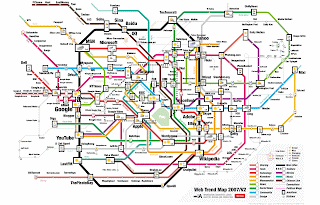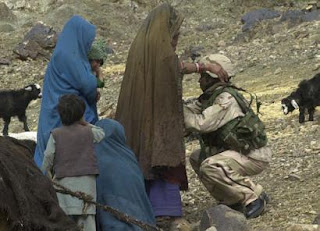"Love Boy", Dana International

"WHO SHALL COMMAND THE SKYLARK NOT TO SING?" (KAHLIL GIBRAN)










 Next stop: this blog, 2008. (Just kidding. Do you see how Western- and Asian-oriented is this iA Web Trendmap 2007 map of the world's "trendy" sites?)
Next stop: this blog, 2008. (Just kidding. Do you see how Western- and Asian-oriented is this iA Web Trendmap 2007 map of the world's "trendy" sites?)One day I shall become what I want.
One day I shall become a bird,
and wrest my being from my non-being.
The longer my wings will burn,
the closer I am to the truth, risen from the ashes.
I am the dialogue of dreamers; I've shunned my body and self
to finish my first journey towards meaning,
which burnt me, and disappeared.
[...]
O my name: where are we now?
Tell me: What is now? What is tomorrow?
What's time, what's place, what's old, what's new?
One day we shall become what we want.






Senza entrare nel merito delle accuse specifiche rivolte nell'ultimo libro di Magdi Allam a singoli colleghi noti a chiunque si interessi di questioni relative al Medio Oriente e all'Islam non solo come ricercatori seri e qualificati, ma persino come persone coinvolte in svariate forme di impegno civile, intendiamo protestare fermamente davanti alla sfrontatezza di chi afferma che le università italiane "pullulano" di docenti "collusi con un'ideologia di morte profondamente ostile ai valori e ai principi della civiltà occidentale e all'essenza stessa della nostra umanità". Ci pare davvero eccessivo che quanti, in sede di dibattito scientifico e civico, esprimono posizioni differenti da una pretesa unica “verità interpretativa” divengano automaticamente estranei a universali valori di civiltà o, addirittura, alieni dalla comune umanità. Una tale impostazione non solo è lontanissima dallo spirito e dai valori di una democrazia costituzionale – e molto più in linea con ideologie totalitarie - ma si pone anche a siderale distanza dal senso critico che sta alla base della ricerca storica e scientifica e dalla stessa, difficile ma essenziale, missione dell'informazione giornalistica in una società plurale. Tutto ciò rischia di contribuire, purtroppo, al preoccupante imbarbarimento dell'informazione in un paese come il nostro che già si trova a pagare un prezzo troppo alto alle varie forme di partigianeria che lo travagliano. Già abbiamo visto sentenze discutibili coinvolgere colleghi noti per la loro serietà ed equilibrio nell'affrontare il tema dell'Islam, con addirittura condanne penali che prevedono la pena detentiva. Il giornalismo rischia di cadere in una logica da tifo calcistico piuttosto che analitica e razionale, soprattutto quando si toccano temi delicati e sensibili come quelli religiosi e, in particolare, relativi all'Islam ed alle questioni legate all'area medio-orientale. La libertà di ricerca ne paga il prezzo, schiacciata tra opposti estremismi interpretativi, e non solo. Ci auguriamo che tali tendenze trovino presto voci più equilibrate e meno partigiane a contrastarle, e che queste trovino a loro volta ascolto nel mondo dell'informazione, in quello politico, in quello culturale e in quello religioso.